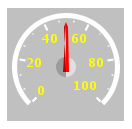

Displays the connected variable on a circular scale.
It can be configured to support user input to set the value of the associated variable.
A Gauge with 2 color zones and a text tag:
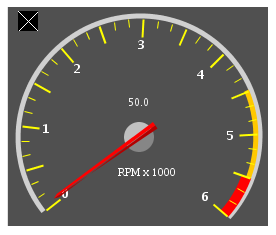
A Gauge using a background image:
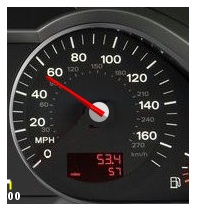
See Geometry.
Position of the top left corner of the circular gauge within the widget. This is specified as a comma separated pair of values: x,y.
Length in pixels of the vertical semi axis of the gauge’s elliptical arc. I.e., the ellipse minor axis b.
Length in pixels of the horizontal semi axis of the gauge’s elliptical arc. I.e., the ellipse major axis a.

Angle in degrees of the beginning of the gauge arc. Angles are measured in trigonometric fashion where 0 is the right-most horizontal position (East) and the angle increments counter clockwise.
Arc measured in degrees.
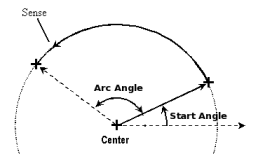
Show the labels and associated tick marks.
Show the circular arc that defines the gauge.
Show value of the associated variable.
Width of arc in pixels.
Number of major ticks along the arc.
Number of minor ticks between the major ticks.
Width in pixels of the gauge’s needle.
Distance in pixels from the hub’s center to the start of the needle. From this point, the needle is drawn outward from hub’s center.
Length in pixels of the needle.
Radius in pixels of the gauge’s center hub.
Length in pixels of the major ticks. Minor ticks half this size.
Value of the first scale label.
Number of labels to draw along the scale.
Distance measured in units of the associated variable separating successive labels.
Position of the value specified as a comma separated pair of values: x,y.
File image to display in the background of the widget.
Font of the labels.
Font of the value when shown.
“printf” style numerical format used to format the scale’s labels. HTML tags are not supported.
“printf” style numerical format used to format the value. HTML tags are not supported.
Background color of the widget. Click on the x button to set null background color. When a null background is selected, the background of the HMI display itself is visible behind the active elements of the widget.
The transparency of the widget background. This applies to the background image as well when a background image is specified. This is a number between 0.0 (completely transparent) and 1.0 (completely opaque).
Color of the gauge’s arc.
Color of the center hub.
Color of the needle.
Color of the labels.
Color of the ticks.
Color of the value.
Maximum expected value for the connected variable. This is the highest value displayed by the gauge. It corresponds to the position of the start of the gauge’s arc.
Minimum expected value for the connected variable. This is the lowest value displayed by the gauge. It corresponds to the position of the end of the gauge’s arc.
Numeric scaling factor to multiply the value of the labels. I.e for a tachometer, use 0.001 so that the label will show as 1,2,3,... when the value is 1000,2000,3000,....
Numeric factor to multiply the value of the connected variable before calculating the position of the gauge needle
Check this so that the needle angular position is computed counter clockwise instead of the default clockwise behavior. Used for gauge that move in the opposite direction.
Allows the user to enter a new value for the associated variable. To set a new value for the variable, simply click the mouse inside the widget and an entry field will be created where the value can be entered.
Maximum value the user can specify for this value. If the value provided is greater than this maximum, an error message is shown and the value is not sent to SIMulation Workbench.
Minimum value the user can specify for this value. If the value provided is less than this minimum, an error message is shown and the value is not sent to SIMulation Workbench.
Defines position and color for each color zone to display. Color zones are bands of color parallel to the scale used to convey information about values within a particular range.
Edit the entries in the table by clicking on the  button. The following dialog will appear:
button. The following dialog will appear:
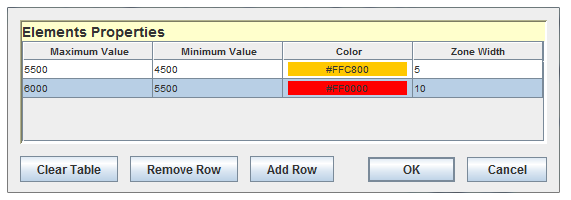
Each zone has the following properties:
Value where this zone ends in units of the connected variable.
Value where this zone begins in units of the connected variable.
Color of the zone.
Width of the zone in pixels.
Places user defined text on the widget display.
Edit the entries in the table by clicking on the  button. The following dialog will appear:
button. The following dialog will appear:
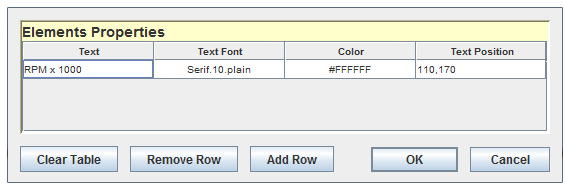
Each text tag has the following properties:
Text to display. HTML tags are not supported.
Font of the text.
Color to use to draw the text.
Position of the text specified as a comma separated pair of values. where x,y where x is the offset from the widget left side and y is the offset from the widget top.

|
y Vs x Plot | Linear Gauge |

|